Related Research Articles

Board games are tabletop games that typically use pieces. These pieces are moved or placed on a pre-marked board and often include elements of table, card, role-playing, and miniatures games as well.
A massively multiplayer online role-playing game (MMORPG) is a video game that combines aspects of a role-playing video game and a massively multiplayer online game.
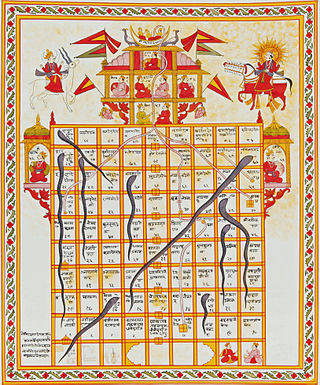
Snakes and ladders is a board game for two or more players regarded today as a worldwide classic. The game originated in ancient India as Moksha Patam, and was brought to the United Kingdom in the 1890s. It is played on a game board with numbered, gridded squares. A number of "ladders" and "snakes" are pictured on the board, each connecting two specific board squares. The object of the game is to navigate one's game piece, according to die rolls, from the start to the finish, helped by climbing ladders but hindered by falling down snakes.

Twister is a game of physical skill produced by Milton Bradley Company and Winning Moves Games USA. It is played on a large plastic mat that is spread on the floor or ground. The mat has four rows of six large colored circles on it with a different color in each row: red, yellow, green and blue. A spinner tells players where they have to place their hand or foot. The game promotes itself as "the game that ties you up in knots".

Milton Bradley Company or simply Milton Bradley (MB) was an American board game manufacturer established by Milton Bradley (1836-1911) in Springfield, Massachusetts, in 1860. In 1920, it absorbed the game production of McLoughlin Brothers, formerly the largest game manufacturer in the United States. It was acquired by Hasbro in 1984, and merged with their subsidiary Parker Brothers in 1998. The brand name continued to be used by Hasbro until 2009.
A stealth game is a type of video game in which the player primarily uses stealth to avoid or overcome opponents. Games in the genre typically allow the player to remain undetected by hiding, sneaking, or using disguises. Some games allow the player to choose between a stealthy approach or directly attacking antagonists, but rewarding the player for greater use of stealth. The genre has employed espionage, counter-terrorism, and rogue themes, with protagonists that are special forces operatives, special agents, secret agents, thieves, ninjas, or assassins. Some games have also combined stealth elements with other genres, such as first-person shooters and also platformers.
Chrononauts is a family of card games that simulates popular fictional ideas about how time travellers might alter history, drawing on sources like Back to the Future and the short stories collection Travels Through Time. The game was designed by Andrew Looney and is published by Looney Labs. The original game and a variant each won the Origins Award for Best Traditional Card Game.
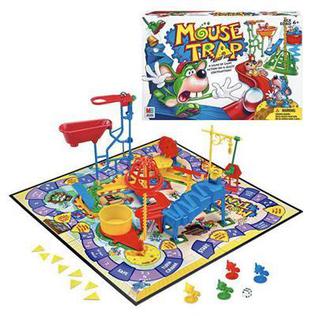
Mouse Trap is a board game first published by Ideal in 1963 for two to four players. It is one of the first mass-produced three-dimensional board games. Players at first cooperate to build a working mouse trap in the style of a Rube Goldberg machine. Then, players turn against each other to trap opponents' mouse-shaped game pieces.

BoardGameGeek (BGG) is an online forum for board gaming hobbyists and a game database that holds reviews, images and videos for over 125,600 different tabletop games, including European-style board games, wargames, and card games. In addition to the game database, the site allows users to rate games on a 1–10 scale and publishes a ranked list of board games.
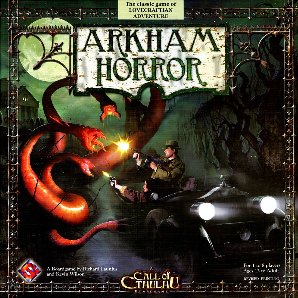
Arkham Horror is a cooperative adventure board game designed by Richard Launius, originally published in 1987 by Chaosium. The game is based on Chaosium's roleplaying game Call of Cthulhu, which is set in the Cthulhu mythos of H.P. Lovecraft and other horror writers. The game's second edition was released by Fantasy Flight Games in 2005, with a third edition in 2018.
Betrayal at House on the Hill is a board game published by Avalon Hill in 2004, designed by Bruce Glassco and developed by Rob Daviau, Bill McQuillan, Mike Selinker, and Teeuwynn Woodruff. Players all begin as allies exploring a haunted house filled with dangers, traps, items, and omens. As players journey to new parts of the mansion, room tiles are chosen at random and placed on the game board; this means that the game is different each session. Eventually the "haunt" begins, with the nature and plot of this session's ghost story revealed; one player usually "betrays" the others and takes the side of the ghosts, monsters, or other enemies, while the remaining players collaborate to defeat them.

Dune is a strategy board game set in Frank Herbert's Dune universe, published by Avalon Hill in 1979. The game was designed by Bill Eberle, Jack Kittredge and Peter Olotka. After many years out of print, the game was reissued by Gale Force Nine in 2019 in advance of the 2021 Dune film adaptation.

Selchow and Righter was a 19th- and 20th-century game manufacturer best known for the games Parcheesi and Scrabble. It was based in Bay Shore, New York.
Race game is a large category of board games, in which the object is to be the first to move all one's pieces to the end of a track. This is both the earliest type of board game known, with implements and representations dating back to at least the 3rd millennium BC in Egypt, Iraq, and Iran; and also the most widely dispersed: "all cultures that have games at all have race games". Race games often use dice to decide game options and how far to move pieces.
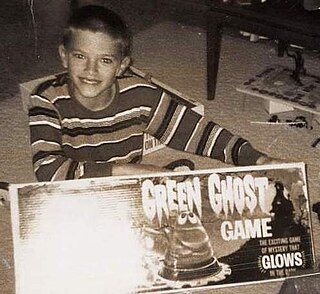
Green Ghost is a board game for up to 4 players, first published in 1965 by Transogram. Green Ghost is the first board game designed to be played in the dark.

Pandemic is a cooperative board game designed by Matt Leacock and first published by Z-Man Games in the United States in 2008. Pandemic is based on the premise that four diseases have broken out in the world, each threatening to wipe out a region. The game accommodates two to four players, each playing one of seven possible roles: dispatcher, medic, scientist, researcher, operations expert, contingency planner, or quarantine specialist. Through the combined effort of all the players, the goal is to discover all four cures before any of several game-losing conditions are reached.

Snakes & Lattes is a board game café chain headquartered in Toronto, Canada, with three venues in the city and five US venues. The chain is often cited as the main inspiration for other board game cafés in the western world. It is sometimes incorrectly called North America's first board game café, though others predate it.
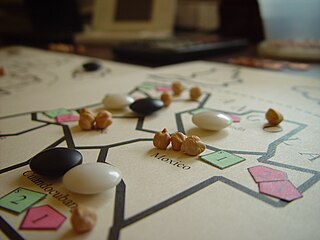
Game design is the process of creating and shaping the mechanics, systems and rules of a game. Games can be created for entertainment, education, exercise or experimental purposes. Additionally, elements and principles of game design can be applied to other interactions, in the form of gamification. Game designer and developer Robert Zubek defines game design by breaking it down into its elements, which he says are the following:

The Spiny Shell, colloquially known as the blue shell, is a power-up item in the Mario Kart video game series. Originating in Mario Kart 64 (1996) and featured in every main entry of the series since then, the Spiny Shell, when used, aims directly at the racer in first place, stopping them on impact. The Spiny Shell acts as a "catch-up" mechanic, with racers ranked towards the bottom having a better chance of it spawning when driving into item boxes, giving them a better chance at diminishing the lead of the racer in top position. In addition to the Mario Kart series, the blue shell appeared in the Super Smash Bros. series from 2001's Melee onwards, and in Mario Hoops 3-on-3. A character based on the item appears in the 2023 film The Super Mario Bros. Movie, voiced by Scott Menville.

An Amerigame, short for American-style board game, is a loose category of tabletop game that generally features a prominent theme, encourages direct conflict between players, and has a significant degree of luck. It is distinguished from a Eurogame, or German-style board game, in that American-style games often have longer playtimes and mechanics designed to suit the theme. Games of this genre are sometimes, if pejoratively, nicknamed Ameritrash.
References
- ↑ Harish Johari (1975), Leela, the Game of Self-Knowledge: Commentaries, ISBN 0-89281-419-5
- ↑ Radoff, Jon (2010), History of Social Games, "History of Social Games". Archived from the original on 2010-05-27. Retrieved 2010-05-24.
- ↑ Althoen, S. C.; King, L.; Schilling, K. (1993). "How Long Is a Game of Snakes and Ladders?". The Mathematical Gazette. 77 (478): 71–76. doi:10.2307/3619261. JSTOR 3619261. S2CID 65071163.
- ↑ "Leela Board Game BoardGameGeek". Board Game Geek. Retrieved 17 February 2013.